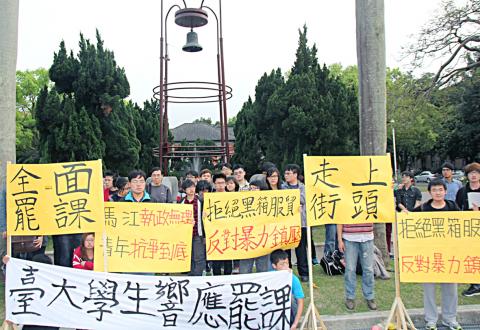Decrying the strong-arm tactics used by police against protesters early yesterday morning in Taipei, the National Taiwan University (NTU) students’ association backed a call by protest leaders Chen Wei-ting (陳為廷) and Lin Fei-fan (林飛帆) for a nationwide “strike.”
As of press time yesterday, more than 45 student groups, totaling 3,000 students from 18 universities — including National Tsing Hua University, National Chengchi University, National Chiao Tung University and National Cheng Kung University — had joined the strike call.
“The government not only failed to respond to the public’s demands, but also took inappropriate measures to attack students, violently suppress them, hurt the country’s backbone and trample on basic human rights,” the NTU group said about the crackdown on the protesters who tried to occupy the Executive Yuan on Sunday night.

Photo: CNA
The statement called for a “strike” on four fronts: putting classes on hold so that students can join protests; holding classes on-site at the protests; teacher support for students’ decision to protest and leniency for those students participating in the demonstrations.
Ko Chih-che (柯志哲), the head of NTU’s sociology department, also issued a statement of support.
The focus of the department’s education and research is on civic participation, procedural justice and social equality, Ko said, adding that: “The department is supportive of all student-organized strikes as long as personal safety is taken into consideration, and it encourages any methods to understand or participate in the development of relevant proceedings.”
NTU Secretary-General Lin Ta-te (林達德) said the university is primarily concerned with the rights of education and the school’s normal operations and procedures.
While strikes are not the best solution to resolving the conflict, if all of the proceedings are in accordance with students’ rights of education and other Ministry of Education regulations, the university would respect any decision to reschedule or relocate classes, Lin said.
Meanwhile, Wang Hung-jen (王宏仁), a sociology professor at National Sun Yat-en University in Greater Kaohsiung, criticized President Ma Ying-jeou (馬英九) for remaining behind barricades and being unwilling to emerge to communicate with the public.
“The department’s teachers are willing to stand by our students in this most precious ‘democracy class,’” Wang said.
Wang said the department decided to suspend all courses until the siege has wound down, at which time it would offer make-up classes.
Students in the department have voted to join the strike.
Taipei Medical University’s administration said that students skipping classes to take part in the protests would not be counted as absent.
Other schools are being more cautious in their support.
Lan Yang Institute of Technology dean Lin Chiang-lung (林江龍) said the school would neither support its students’ participation in the protests, but would not try to block them. Those students who want to participate would have to talk with their teachers to call in an absence, he said.
Minister of Education Chiang Wei-ling (蔣偉寧) appealed to students to remain calm and for teachers at the site of protests to persuade student demonstrators to return to classes.
The ministry does not support student strikes, Chiang said, adding that the rights to education should be maintained for everyone.
Additional reporting by Loa Iok-sin, Chen Yi-ching and Hung Ting-hung

The Ministry of Education (MOE) is to launch a new program to encourage international students to stay in Taiwan and explore job opportunities here after graduation, Deputy Minister of Education Yeh Ping-cheng (葉丙成) said on Friday. The government would provide full scholarships for international students to further their studies for two years in Taiwan, so those who want to pursue a master’s degree can consider applying for the program, he said. The fields included are science, technology, engineering, mathematics, semiconductors and finance, Yeh added. The program, called “Intense 2+2,” would also assist international students who completed the two years of further studies in

Former president Tsai Ing-wen (蔡英文) departed for Europe on Friday night, with planned stops in Lithuania and Denmark. Tsai arrived at Taiwan Taoyuan International Airport on Friday night, but did not speak to reporters before departing. Tsai wrote on social media later that the purpose of the trip was to reaffirm the commitment of Taiwanese to working with democratic allies to promote regional security and stability, upholding freedom and democracy, and defending their homeland. She also expressed hope that through joint efforts, Taiwan and Europe would continue to be partners building up economic resilience on the global stage. The former president was to first

Taiwan will now have four additional national holidays after the Legislative Yuan passed an amendment today, which also made Labor Day a national holiday for all sectors. The Chinese Nationalist Party (KMT) and Taiwan People’s Party (TPP) used their majority in the Legislative Yuan to pass the amendment to the Act on Implementing Memorial Days and State Holidays (紀念日及節日實施辦法), which the parties jointly proposed, in its third and final reading today. The legislature passed the bill to amend the act, which is currently enforced administratively, raising it to the legal level. The new legislation recognizes Confucius’ birthday on Sept. 28, the

The Taipei District Court sentenced babysitters Liu Tsai-hsuan (劉彩萱) and Liu Jou-lin (劉若琳) to life and 18 years in prison respectively today for causing the death of a one-year-old boy in December 2023. The Taipei District Prosecutors’ Office said that Liu Tsai-hsuan was entrusted with the care of a one-year-old boy, nicknamed Kai Kai (剴剴), in August 2023 by the Child Welfare League Foundation. From Sept. 1 to Dec. 23 that year, she and her sister Liu Jou-lin allegedly committed acts of abuse against the boy, who was rushed to the hospital with severe injuries on Dec. 24, 2023, but did not